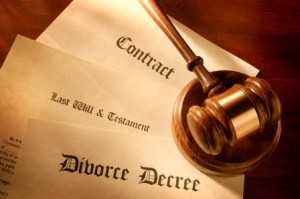

Even after a divorce or separation, one can encounter money problems that stem from your relationship unless your agreement covers these issues, which can run from intertwined debt obligations (like a mortgage or credit card balances) to future support and the division of property. A recent article in the The Huffington Post, titled “Divorce and Money,”says that you should always listen to your attorney about the applicable laws in your state. In addition, the article says that you should also look at the following issues.
The division of property in a divorce is typically not taxable to either party. However, if instead of dividing marital property, one spouse agrees to monthly maintenance (alimony), this will be taxed as ordinary income. And it’s deductible to the paying spouse. The original article also notes that the spouse receiving the maintenance checks must make a quarterly estimated federal and state tax payment, so you need to plan accordingly.
There aren’t really any tax issues associated with child support payments, except for deciding who claims the children as dependents on their tax return. However, as you can imagine, these financial decisions for the children carry the potential for some problems down the road. Usually the parties agree as to who will fund college costs. Yet, when college tuition needs to be paid, that parent just might have a new family and new responsibilities. One option to avoid this headache is to set up a 529 college savings plan now to begin saving for that day.
Many divorce agreements include life insurance to fund future promises of payments. The spouse receiving the death benefit should be the owner and beneficiary of the policy with the ex-spouse making the premium payments. Without this arrangement, there’s nothing to keep an angry ex from changing the beneficiary on that policy.
Another critical issue after a divorce is estate planning. Once you're divorced you should create a new estate plan right away. This can include a will or revocable living trust, a healthcare power of attorney, and a living will. The court will have the ultimate say over the guardianship of your children; however, in a contested divorce, the court will take your written wishes into account. Consult an experienced estate planning attorney and make sure he or she takes you through a discussion on all of your options.
It isn't easy getting divorced, but when it’s over, you'll need to rebuild. Think about these areas as part of your divorce documentation.
For more information about estate planning, please visit my estate planning website.
Reference: The Huffington Post (March 18, 2015) “Divorce and Money”


